
Remote park is home for staff, families
DRY TORTUGAS, Fla.— Mike Ryan, 39, sat in his office which used to be one of the gun rooms at the Fort Jefferson. There was a small opening, now replaced with Ryan’s Dell computer, through which 12-foot-long cannons were fired in the mid 1800s.
“This may sound strange, but we’ve got some trees on the inside of the fort, which were left here by the engineers who built the fort because they understood, that just having a tree, gives a sense of normalcy out here in this very surreal place,” stated Ryan.
Ryan, who has lived in the fort for three years now, likes to relax under a tree once all the visitors are on their way back on the ferry to Key West, which is a 2½ hour ride.
Ryan expressed his frustrations of his life in the fort.
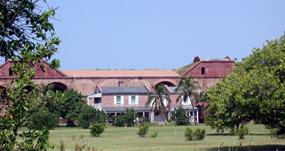 |
The fort’s residence on the parade ground (Staff photo). |
“A couple of times it gets you really fast. You would be going along working really hard for a few days and then suddenly it gets stressful. Sometimes you’re just so burned out and need to get out to the city.”
There are 15 others like Mike Ryan who live in Fort Jefferson, which is the heart of the Dry Tortugas National Park, on a 21-acre island almost 70 miles from Key West.

|
Niki Ryan (above) and Tammie Campbell (below) discuss life in the Dry Tortugas (Photos by Somy Ali). |
One of the residents, Tammie Campbell, 42, has lived in Fort Jefferson for two years.
Campbell works for the National Park Service doing its turtle research program. She enjoys the evenings more than the days mainly due to the 200 to 300 visitors whom she said she doesn’t seem to care for much.
“It’s so quiet here at night. You see billions of tiny little stars and it’s absolutely gorgeous! I love living here,” Campbell stated enthusiastically.
The residents at the fort are deprived of luxuries that come with modern life. In their opinion, people take these comforts for granted, not realizing how much they mean to those who have no access to them.
Danika Bloom, 23, moved to the fort from Montana four months ago. Bloom plans to stay at the fort for two to five years, but is slightly apprehensive about her life there.
“I don’t think this kind of life is for everybody, I miss my boyfriend a lot, who is back home. The phone systems are awful and you can never have conversations for more than two to three minutes without the phone getting disconnected.
“We are so far away from the city. The geographical distance causes problems with the reception and wires of the phone poles.”
“I miss the convenience of a telephone, that contact with my family and friends which I have lost is often depressing.”
“I have had visitors. One of them was a ranger from the Everglades. He said that he liked visiting, but could never live here like I do. It’s just too isolated for him,” noted Bloom.
Bloom likes living in the fort but does feel that it has its drawbacks like anything else in life.
 |
Jerald Johnston uses a cart for much of his work in the national park (Photo by Somy Ali). |
Jerald Johnston, 47, has lived in the fort for four years. His job entails taking the solid waste off the island and recycling it.
Johnston, who moved from Wyoming, is used to the life Fort Jefferson offers.
“I’m used to the heat and the humidity, so it doesn’t bother me much. However, it can be hard for people who have just been posted here to adjust immediately.
“There are 15 of us who live here and not everyone likes each other, but we try to get along. You have to or else you’d lose your job,” stated Johnston.
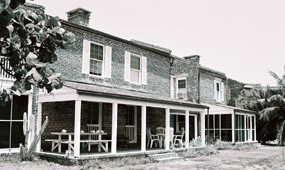
|
The residence (photo above by Chris Rivera, photo below by staff). |
There are also those who are on temporary assignments at Fort Jefferson, thus don’t feel caged in.
Bruce Gantt, 33, has lived in the fort for the past three months. He will leave in another two weeks to go back to his original job as a park ranger in the Everglades.
“I don’t mind working in remote places, but it’s always nice to be able to drive to Burger King occasionally. I can’t wait to get back to my normal job,” stated Gantt.
While some of the residents can’t wait to get out of the fort, there are a few who can’t fathom spending their lives elsewhere.
Niki Ryan, 33, has lived in the fort for three years. She works at the tiny book store and museum in the fort and cherishes every moment of her time spent away from city life.
“I moved here with my husband from New York City. I used to work at the World Trade Center and just got tired of the hustle and bustle of the city.”
Niki Ryan believes that she has never experienced so much peace and comfort in her life. Her husband. Mike Ryan, the lead interpretive ranger. is obsessed with studying forts thus his passion brought them to Fort Jefferson.
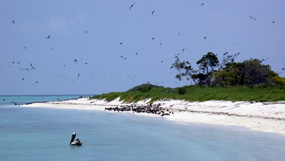
|
Birds are also residents of the park (Staff photos). |
“It’s great living here. We have diesel generators for power. The only thing we rely upon is fuel that’s shipped in. We have maintenance staff responsible for upkeep of the buildings, generators and the boats.”
“During the hurricane season, ironically, this is the safest place to be since the walls are eight feet thick and 45 feet high. There’s no fear of flooding. We get high winds, but it’s like being in a vault. Therefore, extremely safe and no fears.”
Niki Ryan’s only complaint is about the scorpions and rats that live in abundance in the fort .
“The scorpions used to bother me, but we have learned to check our shoes and clothes before putting them on,” stated Ryan.
Although the residents at Fort Jefferson have a few complaints about their lives there, they say that they wouldn’t trade it for anything else.
“It’s not a prison here, when you apply for a job here, they warn you of all the discomforts and lack of normalcy compared to the city life. It’s a choice one makes and is in no way forced to live it,” stated Mike Ryan.


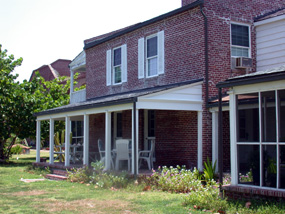
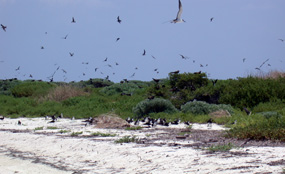
Comments are Closed